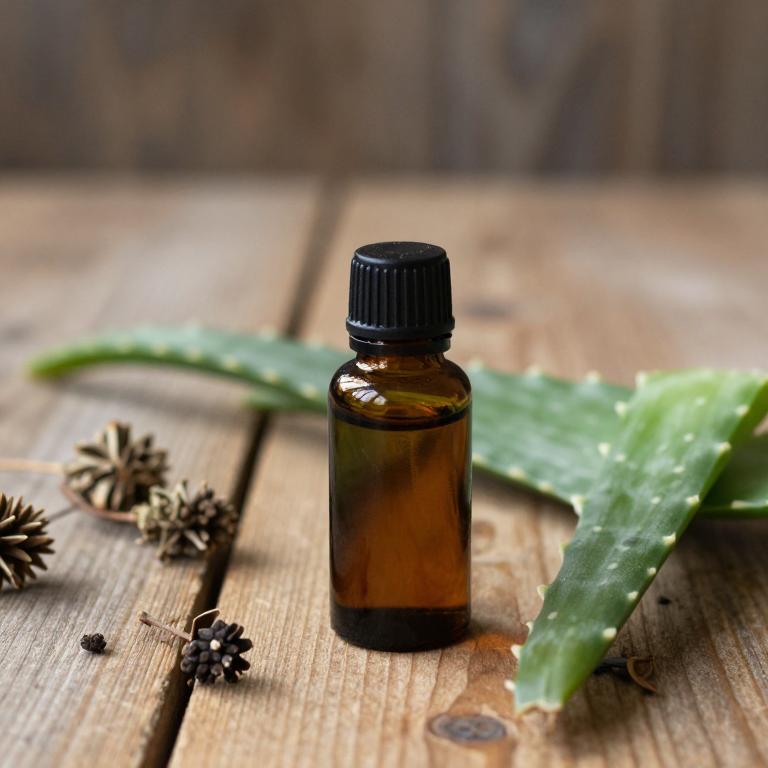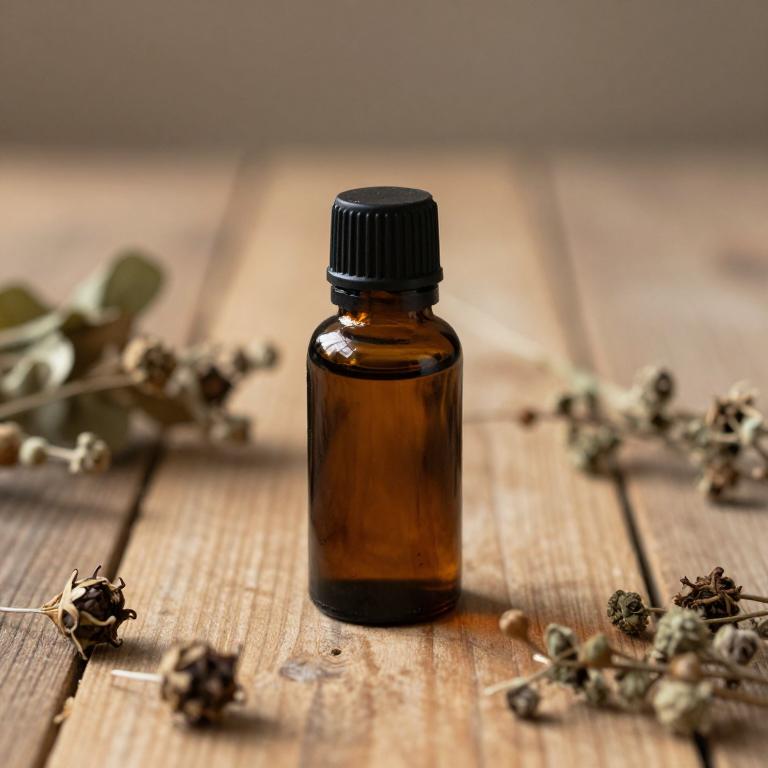10 Best Herbal Essential Oils For Baldness

Herbal essential oils have been explored as natural remedies for promoting hair growth and potentially addressing baldness.
Oils such as rosemary, lavender, and peppermint are commonly used due to their stimulating properties that may enhance blood circulation to the scalp. These essential oils are typically diluted with a carrier oil before application to avoid skin irritation and ensure safe use. Some studies suggest that regular use of these oils may help reduce hair loss and encourage new hair growth in certain individuals.
While they may offer supportive benefits, they should not replace medical treatments for conditions like male pattern baldness.
Table of Contents
- 1. Turmeric (Curcuma longa)
- 2. Aloe vera (Aloe barbadensis)
- 3. Goatweed (Eclipta prostrata)
- 4. Chaste tree (Vitex agnus-castus)
- 5. Stinging nettle (Urtica dioica)
- 6. Bacopa (Bacopa monnieri)
- 7. Salvia (Salvia officinalis)
- 8. Centella (Centella asiatica)
- 9. Ginger (Zingiber officinale)
- 10. Rosemary (Rosmarinus officinalis)
1. Turmeric (Curcuma longa)

Curcuma longa, commonly known as turmeric, is a well-known herb that has been traditionally used for its anti-inflammatory and antioxidant properties.
While curcuma longa itself is not directly used for treating baldness, its essential oils, derived from the rhizomes, have been explored for their potential benefits in hair health. These essential oils contain compounds like curcuminoids, which may help reduce scalp inflammation and support healthy hair growth. However, there is limited scientific evidence supporting the use of curcuma longa essential oils specifically for treating baldness.
As with any herbal remedy, it is important to consult a healthcare professional before using these oils, especially if you have underlying medical conditions or are taking other medications.
2. Aloe vera (Aloe barbadensis)

Aloe barbadensis, commonly known as aloe vera, is often touted for its potential benefits in promoting hair growth and reducing baldness due to its rich content of vitamins, minerals, and antioxidants.
While aloe vera gel is frequently used topically to nourish the scalp and improve hair health, the essential oils derived from aloe barbadensis are less commonly explored for their role in hair regrowth. These essential oils may contain bioactive compounds that could stimulate follicles and enhance blood circulation to the scalp, potentially supporting healthier hair growth. However, scientific evidence specifically linking aloe barbadensis essential oils to the reversal of baldness remains limited, and more research is needed to confirm their efficacy.
As with any herbal treatment, it is advisable to consult a healthcare professional before using aloe-based products for hair loss concerns.
3. Goatweed (Eclipta prostrata)

Eclipta prostrata, also known as false dandelion, is a traditional herbal plant used in Ayurvedic medicine for its potential benefits in promoting hair growth.
The essential oils derived from Eclipta prostrata are believed to contain bioactive compounds that may stimulate hair follicles and improve scalp health. These oils are often applied topically to the scalp to encourage new hair growth and reduce hair loss. While some studies suggest that Eclipta prostrata may help in treating baldness, more research is needed to confirm its efficacy and safety for long-term use.
As with any herbal remedy, it is advisable to consult a healthcare professional before incorporating Eclipta prostrata essential oils into a baldness treatment regimen.
4. Chaste tree (Vitex agnus-castus)

Vitex agnus-castus, commonly known as chaste tree, has been traditionally used in herbal medicine for its potential hormonal balancing effects, which may support hair growth.
Essential oils derived from Vitex agnus-castus are believed to stimulate the scalp and improve circulation, potentially promoting healthier hair follicles. While there is limited scientific evidence directly linking Vitex essential oils to the prevention or treatment of baldness, some studies suggest that its compounds may influence hormone levels that affect hair loss. When used in aromatherapy or topical applications, these oils are often combined with other hair-stimulating ingredients for enhanced results.
However, it is important to consult a healthcare professional before using Vitex essential oils, especially for individuals with hormonal imbalances or sensitive skin.
5. Stinging nettle (Urtica dioica)

Urtica dioica, commonly known as stinging nettle, has been traditionally used in herbal medicine for its purported health benefits, including support for hair growth.
While there is limited scientific evidence directly linking stinging nettle essential oils to the prevention or treatment of baldness, some studies suggest that compounds found in the plant may stimulate hair follicles and improve scalp health. Essential oils derived from Urtica dioica are often used in topical applications, such as scalp massages, to promote circulation and potentially enhance hair growth. However, it is important to note that more research is needed to confirm the effectiveness of these oils for addressing baldness.
As with any herbal remedy, it is advisable to consult a healthcare professional before using stinging nettle essential oils, especially if you have sensitive skin or existing medical conditions.
6. Bacopa (Bacopa monnieri)

Bacopa monnieri, also known as Brahmi, is a traditional Ayurvedic herb that has been studied for its potential benefits in promoting hair growth and preventing baldness.
While research on bacopa monnieri essential oils for baldness is limited, some preliminary studies suggest that the herb may enhance scalp health and stimulate hair follicles due to its antioxidant and anti-inflammatory properties. Essential oils derived from bacopa monnieri are often used in aromatherapy and topical applications, though their effectiveness for hair loss specifically requires further scientific validation. Some users report improved scalp condition and increased hair density when using bacopa-based products consistently.
As with any herbal remedy, it is advisable to consult a healthcare professional before incorporating bacopa monnieri essential oils into a baldness treatment regimen.
7. Salvia (Salvia officinalis)

Salvia officinalis, commonly known as sage, contains essential oils that have been traditionally used for their aromatic and therapeutic properties.
While there is limited scientific evidence directly linking sage essential oils to hair growth, some studies suggest that compounds like thujone and camphor may stimulate scalp health and improve blood circulation. These essential oils are often used in aromatherapy and topical applications to promote a healthy scalp environment, which can support hair follicle function. However, it is important to note that sage essential oils should be diluted before use and may not be effective as a standalone treatment for baldness.
Further research is needed to fully understand the potential benefits of sage essential oils in addressing hair loss.
8. Centella (Centella asiatica)

Centella asiatica, also known as gotu kola, is a traditional herb widely used in Ayurvedic and Chinese medicine for its skin-healing and hair-stimulating properties.
Its essential oils, derived from the leaves through steam distillation, contain compounds like asiatic acid and madecassol, which are known to promote collagen production and enhance tissue repair. These properties may help in strengthening hair follicles and improving scalp health, potentially supporting hair growth in cases of baldness. However, while some studies suggest its benefits for hair health, more clinical research is needed to confirm its efficacy for treating baldness specifically.
As with any herbal treatment, it is advisable to consult a healthcare professional before use, especially if considering it as a complementary therapy for hair loss.
9. Ginger (Zingiber officinale)

Zingiber officinale, commonly known as ginger, contains essential oils that have been explored for their potential benefits in promoting hair growth and preventing baldness.
These essential oils, extracted through steam distillation, are rich in bioactive compounds such as gingerol and shogaol, which possess anti-inflammatory and antioxidant properties. Some studies suggest that these compounds may stimulate blood circulation in the scalp, which can support the growth of healthy hair. However, while preliminary research is promising, there is currently limited scientific evidence to conclusively prove that ginger essential oils can treat baldness.
As with any natural remedy, it is advisable to consult a healthcare professional before using ginger essential oils for hair loss concerns.
10. Rosemary (Rosmarinus officinalis)

Rosmarinus officinalis, commonly known as rosemary, is a fragrant herb whose essential oil has been traditionally used for its potential benefits in hair health.
The essential oil of rosemary contains compounds like cineole and camphor, which may stimulate blood circulation in the scalp and promote hair growth. Some studies suggest that rosemary oil could help reduce hair loss and encourage the regrowth of hair in individuals experiencing thinning or baldness. However, it is important to note that while preliminary research shows promise, more extensive clinical trials are needed to confirm its effectiveness for baldness.
When used as part of a comprehensive hair care routine, rosemary essential oil may offer natural support for maintaining healthy hair growth.